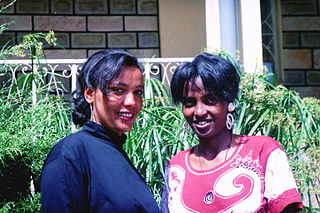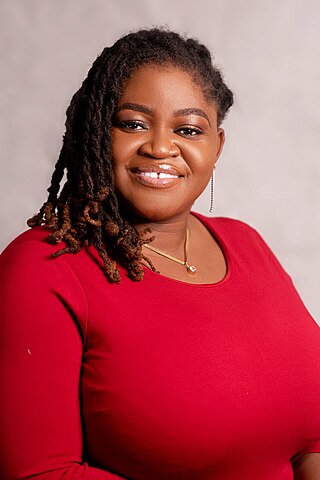Related Research Articles

Sheikh Hasina Wazed is a prominent Bangladeshi politician who has been serving as the Prime Minister of the People’s Republic of Bangladesh since January 2009. She is the longest-serving prime minister in the history of Bangladesh, having previously served as the country's prime minister from 1996 to 2001. As of 6 May 2023, she is the world's longest-serving female head of government in history. Sheikh Hasina is also the president of the Awami League, one of the two major political parties in Bangladesh.
Gender equality, also known as sexual equality or equality of the sexes, is the state of equal ease of access to resources and opportunities regardless of gender, including economic participation and decision-making; and the state of valuing different behaviors, aspirations and needs equally, regardless of gender.

Violence against women (VAW), also known as gender-based violence and sexual and gender-based violence (SGBV), are violent acts primarily or exclusively committed by men or boys against women or girls. Such violence is often considered a form of hate crime, committed against women or girls specifically because they are female, and can take many forms.

The Bangladesh Chhatra League, formerly known as the East Pakistan Student League, often simply called the Chhatra League, is a students' political organisation in Bangladesh, founded by Sheikh Mujibur Rahman on 4 January 1948. BSL is the student wing of the Bangladesh Awami League.

There have been several studies concerning women in Ethiopia. Historically, elite women in Ethiopia have been visible as administrators and warriors. This never translated into any benefit to improve the rights of women, but it had meant that women could inherit and own property and act as advisors on important communal matters. As late as the first part of the 20th century, Queen Menen, consort of Emperor Iyasu IV, had a decisive role in running the Ethiopian Empire. Workit and Mestayit regents to their minor sons have been held responsible for their provinces. They owed their rights to landed property because of a special type of land tenure that expected tenants to serve as militia to overlords, irrespective of gender. In 1896, Empress Tayetu Betul, wife of Emperor Menelik II, actively advised the government and participated in defending the country from Italian invasion. Prominent and other landowning women fought against the second invasion in 1935–41. With the assistance of European advisors, women in the ensuing period were kept out of the army and politics, even as advisors. Instead, they were restricted to family and household work of raising children and cooking. With a steady increase in female representation in education, they have started to undertake nursing, teaching, and other similarly supportive roles. Over the 2018–2019 period, their gradual participation in state politics has been increasing at a steady pace.

The status of women in Bangladesh has been subject to many important changes over the past few centuries. Bangladeshi women have made significant progress since the country's independence in 1971, where women in the region experienced increased political empowerment for women, better job prospects, increased opportunities of education and the adoption of new laws to protect their rights through Bangladesh's policies in the last four decades. Still, women in Bangladesh continue to struggle to achieve equal status to men due to societal norms that enforce restrictive gender roles as well as poor implementation of laws that were set to protect women.

Throughout history, the political, social, and economic status of women in Jordan has varied based on the legal, traditional, cultural and religious values at the time. Women's rights and experiences in Jordan also vary based on other factors, such as class, place of origin, religion, and other factors. In 2020, the World Economic Forum's Global Gender Gap Index, which amalgamates data on economic behavior, educational attainment, health and survival, and political empowerment, ranked Jordan 138 out of 153 nations.

Julie Bindel is an English radical feminist writer. She is also co-founder of the law reform group Justice for Women, which has aimed to help women who have been prosecuted for assaulting or killing violent male partners.
During the 1971 Bangladesh Liberation War, members of the Pakistani military and Razakars raped between 200,000 and 400,000 Bengali women and girls in a systematic campaign of genocidal rape. Most of the rape victims of the Pakistani Army and its allies were Hindu women. Some of these women died in captivity or committed suicide while others moved to India. Imams and Muslim religious leaders declared the women "war booty”. The activists and leaders of Islamic parties are also accused to be involved in the rapes and abduction of women.

The Goldin Institute is a non-profit organization based in Chicago, Illinois, US, that works directly with communities around the globe to create their own strategies and solutions to issues such as poverty alleviation, environmental sustainability, gender empowerment and conflict resolution.

Shirin Sharmin Chaudhury is a Bangladeshi politician who has served as the first female Speaker of the Jatiya Sangsad since April 2013. At 46 years of age, she became the youngest to assume the office.She was also the Chairperson of the Executive Committee of the Commonwealth Parliamentary Association between 2014 and 2017. She previously served as the state minister of the Ministry of Women and Children Affairs of Bangladesh.
Naila Kabeer is an Indian-born British Bangladeshi social economist, research fellow, writer and Professor at the London School of Economics. She was also president of the International Association for Feminist Economics (IAFFE) from 2018 to 2019. She is on the editorial committee of journals such as Feminist Economist, Development and Change, Gender and Development, Third World Quarterly and the Canadian Journal of Development Studies. She works primarily on poverty, gender and social policy issues. Her research interests include gender, poverty, social exclusion, labour markets and livelihoods, social protection, focused on South and South East Asia.
Gender inequality has been improving a lot in Bangladesh, inequalities in areas such as education and employment remain ongoing problems so women have little political freedom. In 2015, Bangladesh was ranked 139 out of 187 countries on the Human Development Index and 47 out 144 countries surveyed on the Gender Inequality Index in 2017. Many of the inequalities are result of extreme poverty and traditional gender norms centred on a patrilineal and patriarchal kinship system in rural areas.
Feminism in Bangladesh seeks equal rights of women in Bangladesh through social and political change. Article 28 of Bangladesh constitution states that "Women shall have equal rights with men in all spheres of the State and of public life".
As of 2018, the African country Rwanda ranks in the top five countries for gender equality according to the Global Gender Gap Report. The idea of fairness that dominates this country arose after the genocide against the Tutsi that occurred in 1994. The government is committed to ensuring equal rights for women and men without prejudice to the principles of gender equality and complementarity in national development. These ideas are exhibited through the roles of Rwanda women in government, the respect for women's education and the role of women in Rwanda healthcare. The country also took an active stance against rape in genocide, created a national action plan after United Nations Resolution 1325, and is pushing towards ending gender-based violence.
Khushi Kabir is a Bangladeshi social activist, feminist, and environmentalist.
Virginia Khunguni is a women's rights activist from Malawi. She is the founder and director of Girls Arise for Change, an organization that aims to empower women in order to foster social and cultural change. The organization led initiatives in combatting child labor, child marriage and sexual exploitation. Khunguni is a recipient of Queen's Young Leader Award for her work in Africa.
Shalu Nigam is an Indian lawyer, feminist legal scholar, and author. She was the petitioner in the landmark case Shalu Nigam v. Regional Passport Officer, decided on 17 May 2016, which held that passports can be issued without requiring the name of the father.
Rima Sultana Rimu is a Bangladeshi women's rights activists and advocate for gender-responsive humanitarian action in Cox's Bazar. She was named as one of the BBC's 100 Women for 2020.

Osasu Edobor is a Nigerian gender advocate and founder of Think Help Restore(THR) Media and the Safe Space Initiative. She is a licensed Mental Health First-Aider, Peer Educator Trainer, and Counselor. As a campaigner for gender inclusion, Osasu created the HERFessions app, which provides support for survivors of sexual abuse. She is a 2018 Mandela Washington Fellow alumna and a Young African Leaders Initiative member.
References
- ↑ "Two Bangladeshis among winners of Queen's Young Leaders Award 2018 | Singapore News Tribe". Singapore News Tribe. 6 December 2017. Retrieved 18 November 2020.
- ↑ "Zaiba Tahyya | Queen's Young Leaders" . Retrieved 18 November 2020.
- 1 2 "Ayman, Zaiba win The Queen's Young Leaders 2018 award". The Daily Star. 5 December 2017. Retrieved 18 November 2020.
- 1 2 "Preventing violence and exploitation". www.unicef.org. Retrieved 18 November 2020.
- ↑ Huda, Tasfia (7 August 2019). "Working towards a better tomorrow". Dhaka Tribune. 2A Media Limited. Retrieved 18 November 2020.
- 1 2 3 4 5 "ZAIBA TAHYYA - AN INSPIRATION FOR THE YOUTH". BBF Digital. 23 January 2019. Retrieved 18 November 2020.
- 1 2 3 4 "'I feel that I am able to make the women in my community proud and encourage them to raise their voices more'". Dhaka Tribune. 21 June 2018. Retrieved 18 November 2020.
- ↑ "Global Shapers | Zaiba Tahya". Global Shapers Community Dhaka. Retrieved 18 November 2020.
- ↑ Ahasan, Nazmul (12 November 2017). "Cyber Attorokkha: How education and training have changed the online experience for Bangladeshi women". The Hindu. THG PUBLISHING PVT LTD. Retrieved 18 November 2020.